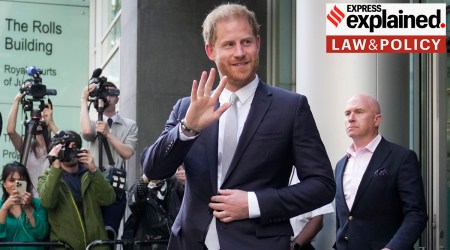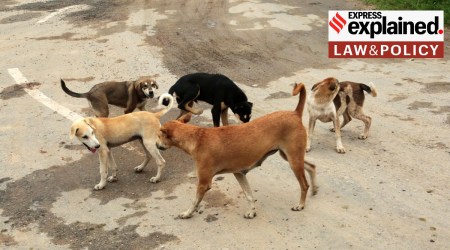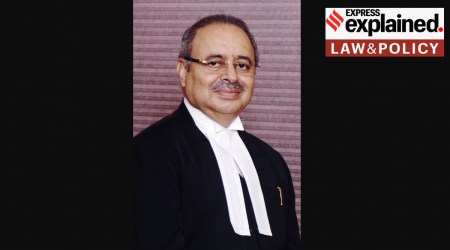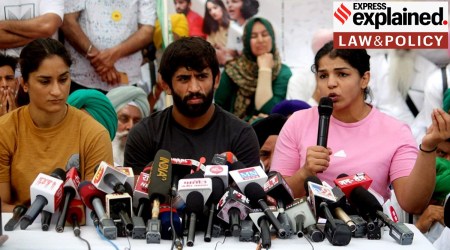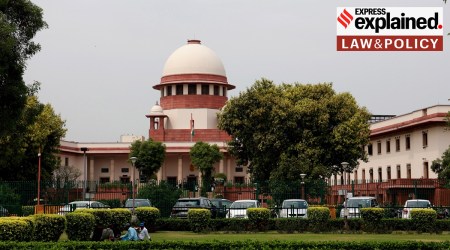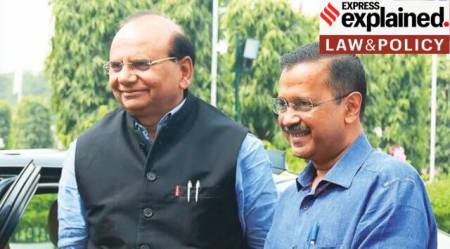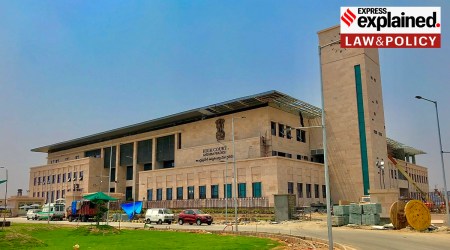EXPLAINED LAW NEWS - Page 25
Prince Harry’s lawsuit against British tabloids: The case, his testimony and its significanceSubscriber Only
The case brings to the forefront the battle between aspects of media freedom and an individual’s privacy. Although it’s commonplace for a public figure's privacy to be diluted because people have a right to know something which is in the public interest, Harry is making the point that some of the information about him could have only been procured unlawfully.
‘Sexual intent’ in POCSO, definition of obscenity: Why Kerala HC threw out case against activistSubscriber Only
The mere sight of a woman’s naked upper body should not be deemed sexual by default — and it should be considered in the context in which it was published, the court observed.
Why the Gauhati HC quashed Nagaland govt’s notification banning dog meat’s sale and tradeSubscriber Only
An order issued on July 4, 2020, by the office of the Chief Secretary of Nagaland had banned dog markets, the commercial import and trading of dogs, as well as the commercial sale of dog meat in markets and in dine-in restaurants.
Adverse possession: What is it, what has the Law Commission said about itSubscriber Only
The concept of adverse possession stems from the idea that land must not be left vacant but instead, be put to judicious use. Essentially, adverse possession refers to the hostile possession of property.
The reasons Law Commission gave while recommending a stronger sedition lawSubscriber Only
Section 124A of the Indian Penal Code penalises a crime against the state. What reasons has the Law Commission given for retaining the contentious provision? We explain.
‘Bank can’t refuse education loan over student’s CIBIL score’: What the Kerala HC heldSubscriber Only
In its ruling, the court also relied on two Kerala High Court rulings from the year 2020 on education loans. Here's what they said.
What is necrophilia and is it an offence in India?Subscriber Only
While hearing a petition filed by a man convicted of murder and rape, the Karnataka HC recently ruled that having sexual intercourse with the dead body of a woman can't fall under the ambit of rape or unnatural offences under the IPC.
What are provisions for university students to take maternity leave?Subscriber Only
In 2016, the UGC, by way of its "Minimum Standards and Procedure for Award of MPhil / PhD Degrees Regulations," allowed women candidates maternity or childcare leave once during the entire duration of their MPhil or PhD course, for up to 240 days.
Can the govt claim immunity when entering contracts under the President’s name? Here’s what SC has ruledSubscriber Only
Article 299 of the Constitution provides that "all contracts made in the exercise of the executive power of the Union or of a State shall be expressed to be made by the President or by the Governor of the State".
What is the Model Prisons Act announced by the MHA?Subscriber Only
With an intent to replace antiquated colonial era prison laws, the Model Prisons Act 2023 will shift the focus of incarceration from "retributive deterrence" to "reform and rehabilitation".
Why the SC acquitted a man on death row for the rape and murder of six-year-oldSubscriber Only
The Supreme Court underlined 'yawning gaps' in the conviction of Prakash Nishad in Thane. Here's what the case was about.
Protesting wrestlers say ready for narco test: What is it, how does it workSubscriber Only
In 2010, the Supreme Court ruled on the legality and admissibility of narco tests. What was the legal position before that? Is information obtained through such tests valid evidence?
Govt’s power to promulgate, repromulgate Ordinances — why and howSubscriber Only
An Ordinance “shall have the same force and effect as an Act of Parliament”. But the government is required to bring an Ordinance before Parliament for ratification — and failure to do so will lead to its lapsing “at the expiration of six weeks from the reassembly of Parliament”.
CJI Chandrachud condemns ‘forum shopping’: What is this practice?Subscriber Only
When litigants or lawyers attempt to deliberately move their case to a particular judge or Court where they think the judgment could be more favourable, they are said to be “forum shopping.”
Case against BBC Modi documentary in Delhi HC: Who is the ‘indigent person’ filing the suitSubscriber Only
The case in Delhi HC against BBC has been filed by Justice For All under Order 33 of the Code of Civil Procedure, “seeking permission to file as an indigent person”. What does this mean?
Centre files review petition against SC order on Delhi services: How does a review petition get heard in court?Subscriber Only
The Constitution itself gives, under Article 137, the Supreme Court the power to review any of its judgments or orders. Can anyone approach the court for a review petition? We explain.
Before Delhi ‘services’ case, other instances of Govt overturning SC’s ordersSubscriber Only
The Centre's ordinance effectively nullifies the Supreme Court's decision granting the Delhi government power over services in the capital. This is not the first time the central government has overturned the apex court's decision. We take a look at some prior instances.
What is Article 239AA, and how the Supreme Court interpreted it in its Delhi services verdictSubscriber Only
Two Constitution Benches of the Supreme Court have dealt with the issue of the powers of the Delhi government. Both of these judgments involve the interpretation of Article 239AA of the Constitution.
What is mitigation investigation for death row convicts, what has the Kerala HC orderedSubscriber Only
Why is the Kerala HC order important? What has the SC said on mitigation investigations? We explain.
SC vs Centre in Delhi: Unanimous verdict overturned within days, what can happen now?Subscriber Only
The Centre on Friday promulgated an ordinance to nullify the Supreme Court's decision to give the Delhi government powers over administrative services in the national capital. This order raises several key questions.
Centre passes ordinance to nullify SC decision favouring Delhi govt: A look at the SC verdict and the ordinance that followedSubscriber Only
The Ordinance creates a new statutory body comprising the Delhi CM and two senior bureaucrats which will make recommendations to the L-G regarding “transfer posting, vigilance and other incidental matters.” Not only can the L-G reject the body's recommendations, the body itself will decide on matters by majority, meaning that two senior bureaucrats could technically overrule the elected chief minister of Delhi.
Freedom of speech the ‘bulwark’ of democracy: Why the Andhra HC struck down order seeking to regulate public assemblies, processionsSubscriber Only
While striking down the government order, a two-judge bench of the Andhra High Court held that the "tradition of public meetings, processions and assemblies" is "historically, culturally and politically" significant in the country.
Supreme Court upholds Tamil Nadu law allowing jallikattu: What is this decade-old case?Subscriber Only
Tamil Nadu, Maharashtra, and Karnataka had in 2017 passed amendments to the central law against cruelty to animals in order to allow traditional sports such as the taming of bulls during Pongal. This was done after the SC in 2014 banned jallikattu. A Constitution Bench has now ruled that the changes in the law were valid — but the issue of jallikattu must be decided by Parliament.
Sri Lanka’s Supreme Court gives ‘green light’ to decriminalise homosexuality: The case and the India connectionSubscriber Only
While dismissing a batch of petitions which challenged the constitutionality of the proposed amendment that will decriminalise homosexuality in Sri Lanka, the Sri Lankan Supreme Court referred to various judgements delivered by its Indian counterpart.
After SC’s services verdict, why the Delhi govt is back in courtSubscriber Only
The bone of contention in the latest Delhi-Centre spat was Services Minister Saurabh Bharadwaj’s decision to replace the Services Secretary, Ashish More.
BEST OF EXPRESS



Must Read


